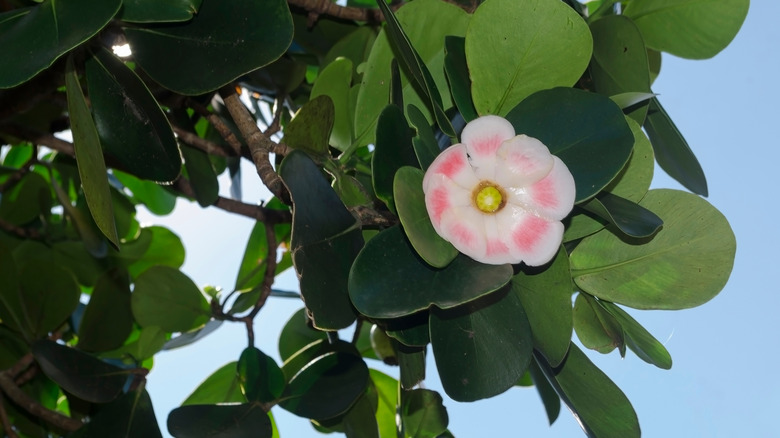Why You Should Avoid Growing Clusia Plants If You Have A Furry Companion
At first glance, the clusia rosea seems harmless. Small pink and white flowers adorn its leaves and light green fruit bears its branches. It makes for a tranquil picture. However, these flowers are like vampires, coming out mostly in the summer during nights or overcast mornings. Meanwhile, the fruit oozes a sticky, black substance once used to caulk boat seams, giving it the nickname "pitch apple." It's also casually referred to as the autograph tree because, like pen to paper, whatever you etch onto its leaves becomes permanent.
As intriguing as the plant is, pet owners beware. Clusia rosea is one plant you should never grow in a home with pets because it could poison your fur babies. In fact, the American Society for the Prevention of Cruelty to Animals (ASPCA) notes the plant as poisonous to cats, dogs, and horses. Specifically, the leaves carry some toxins while the fruit is the most poisonous part.
What happens if your pet eats clusia rosea?
If your pet ingests clusia rosea, it's not an automatic death sentence, but the earlier your pet receives treatment, the better. Immediate care can mean the difference between your pet recovering from a mild case or developing something like organ failure. If you know your four-legged friend ate clusia rosea, or anything toxic for that matter, The American Kennel Club recommends contacting your vet, emergency vet or the Pet Poison Helpline at (855) 764-7661. You can also call the ASPCA's Animal Poison Control Center at (888) 426-4435.
Whomever you choose to call, you'll need to provide your pet's symptoms, so keep an eye out for the following signs in both cats and dogs: digestive distress like an upset stomach and vomiting, as well as drooling and slowed activity. It's important to be aware that some cases require extra vigilance because symptoms aren't always noticeable right away and may take hours to develop.
While specific symptoms of clusia rosea poisoning in horses aren't confirmed, some general signs of toxic plant ingestion include trouble swallowing and breathing, colic, laminitis, and weakness. Removing your horse away from the plant is recommended because the amount of plant ingested determines the chances of recovery, as well as the treatment plan by your vet.
Tips to prevent toxic plant ingestion
Like other threats to your pet's health, prevention is key to keeping pets from ingesting clusia rosea. A simple way to do this is with early detection of the plant. If you recognize clusia rosea outside when it's young, you can remove the plant manually or cut it with tools. Otherwise, it's best to just keep pets out of the plant's space. You can also support your pets by keeping an eye out for the tree while walking your dog or on trail rides with your horse. Provide enough forage for your horse to prevent grazing on potentially poisonous plants, like the clusia rosea.
This plant can also be grown indoors, so it's important to be intentional if you plan to grow and care for a clusia rosea autograph tree. The good news is, you can make your house more pet friendly by placing the plant completely out of your pets' reach, keeping in mind the jumping and/or climbing habits of your cat or dog.
It's reassuring to know that not all clusia plants are as toxic as clusia rosea, but you still want to proceed with caution before allowing your pets near them given the poisonous qualities of other varieties. Dwarf clusia (clusia guttifera), for example, doesn't have the same chemical makeup as clusia rosea. However, this clusia species can still cause digestive issues in cats and dogs alike, so it may be beneficial to err on the safe side.


